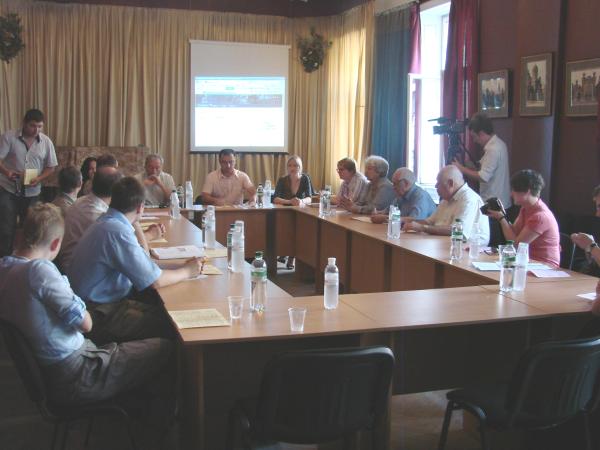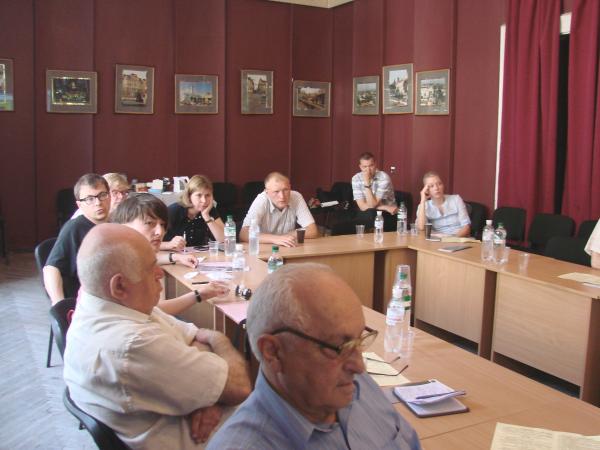Click the image to enlarge |
 |
 |
 |
 |
 |
 |
 |
The scientific-practical seminar "Remembering the Forgotten: Jews in Poland and Ukraine" was held
by the Museum of the History and Culture of Bukovinian Jews on the 13th of July 2010. The seminar
aimed to discuss problems of the preservation and restoration of historical memory as well as of
the spiritual-cultural heritage of Jews in Poland and Ukraine. It was held in cooperation of the
Museum with partner institutions in Warsaw. The mutual realization of the international project
"Discourse of internal and external memory of Hasidic culture in Bukovina" became the reason
for gathering. Specialists on research of the Jewish cultural legacy, scientists, civil figures,
as well as representatives of the local Jewish organizations and other interested persons
participated in the seminar.
The seminar started with the topic "Ways and Means of actualization of the memory of the Jewish Past".
At first, Polish colleagues presented two projects. One of them has already been completed during
previous years and the other is at the stage of implementation, but both are concerned with the
Jewish past. In particular, the Polish researcher Anna Chialovich spoke about the creation of the
Internet-portal
"My Jewish Warsaw", and demonstrated it to the guests.
The aim of the Internet-portal is the virtual recreation and visualization of the old Warsaw,
which disappeared because of the different historical circumstances of the 20th century; the
old Warsaw, which is not very well known by its present citizens. The other project implemented
by the Polish colleagues had a similar goal. The practical outcome of this project is the exhibition
"Mokum", which shows us pre-war Warsaw focusing on the life and work of the Hasidic Tzadiks (Rabbis).
Moreover, the Polish researcher Yuzef Markievich introduced the project "Transnistria",
which goal was to research the memory of Jewish and Roma peoples concerning the Jewish
and Romani tragedy in Ukraine during World War II.
Piotr Pazhin'ski, editor-in-chief of the Warsaw journal "Midrash", dedicated his report to the
results of his historical-biographical research of the literary legacy of Shmuel Yosef Agnon (Shmuel
Czaczkes), who was born in Buczacz (Galicia, Ukraine) and was awarded the Nobel Prize in Literature
in 1966.
Concluding the first part of the seminar, Natalya Shevchenko, representative of Chernivtsi and specialist
of museum work, told the participants about the creation of the Jewish museum in Chernivtsi and its role
for the preservation and popularization of the Jewish spiritual-cultural legacy.
The second part of the seminar was dedicated to the issues of the Jewish architectural monuments'
preservation. It was opened by a meaningful report on the conditions of Jewish architectural monuments
in Ukraine, given by Joseph Zissels, initiator of the Chernivtsi Jewish museum's creation, chairman of
Association of Jewish Organization and Communities (VAAD) of Ukraine, famous human rights activist and
civil figure. He stressed the terrible conditions of the former Jewish cult edifices in Ukraine, most
of which are unique. Joseph Zissels also mentioned the absence of government interest concerning the
preservation of these edifices and their use for the creation of an attractive international cultural
image of Ukraine.
Monika Kravchyk, the general director of the Foundation for the Preservation of the Jewish Heritage
in Poland, told the seminar's participants about the corresponding situation in Poland. According to
her words we may say that our neighbors' situation of the preservation and restoration of Jewish
historical and architectural monuments is also far from good. Nevertheless, access to resources of
the European Union makes the Polish perspectives in this field more promising.
Olena Pushkova, the head of the Sector of Cultural Heritage Protection of Chernivtsi City Council,
made a report on the analysis of the situation concerning the preservation and restoration of the
Jewish architectural monuments in Chernivtsi. In her opinion, the situation in this field is highly
affected not just by the lack of financial support, but also by geological processes in the lower
part of the city. For example, the latest landslip in a part of Barbjusa Street proved that there
was a danger of further landslip of all of the former so called Jewish quarter.
Sviatoslav Pomerantsev, enterpriser and president of the festival "Meridian Czernowitz",
informed the seminar's participants about the course of the restoration of the building the former
residence of the Hasidic Tzadiks' from of the Fridman dynasty, which is situated in Sadhora.
Concluding the seminar, Mykola Kushnir, director of Chernivtsi Museum of the History and Culture
of Bukovinian Jews, turned the attention of the participants to the problem of the preservation
of unique murals in the former Jewish synagogue in Nowocelytsya. These paintings were accidently
discovered under a layer of plaster a few years ago and are in danger of complete destruction because
of the building's neglected condition.
In conclusion, many interesting ideas concerning the raised issues were expressed and ways of further
cooperation between interested individuals and institutions in Chernivtsi and Warsaw were worked out.
The practical outcome of the seminar was the decision to show the exhibition "Mokum", which was presented
by Polish colleagues, in the city above the river Prut.
|
|
|